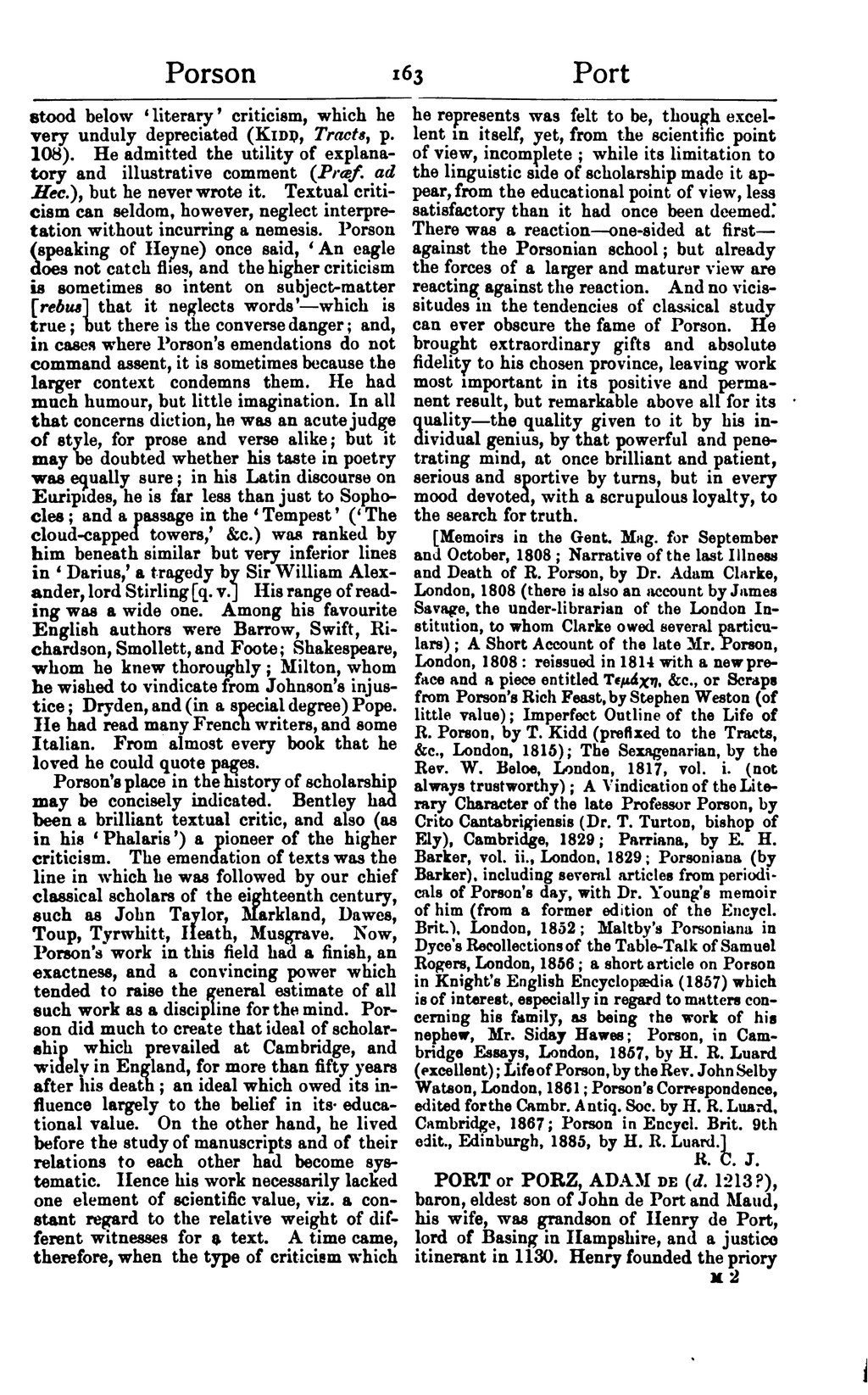stood below ‘literary’ criticism, which he very unduly depreciated (Kidd, Tracts, p. 108). He admitted the utility of explanatory and illustrative comment (Præf. ad Hec.), but he never wrote it. Textual criticism can seldom, however, neglect interpretation without incurring a nemesis. Porson (speaking of Heyne) once said, ‘An eagle does not catch flies, and the higher criticism is sometimes so intent on subject-matter [rebus] that it neglects words’—which is true; but there is the converse danger; and, in cases where Porson's emendations do not command assent, it is sometimes because the larger context condemns them. He had much humour, but little imagination. In all that concerns diction, he was an acute judge of style, for prose and verse alike; but it may be doubted whether his taste in poetry was equally sure; in his Latin discourse on Euripides, he is far less than just to Sophocles; and a passage in the ‘Tempest’ (‘The cloud-capped towers,’ &c.) was ranked by him beneath similar but very inferior lines in ‘Darius,’ a tragedy by Sir William Alexander, lord Stirling [q. v.] His range of reading was a wide one. Among his favourite English authors were Barrow, Swift, Richardson, Smollett, and Foote; Shakespeare, whom he knew thoroughly; Milton, whom he wished to vindicate from Johnson's injustice; Dryden, and (in a special degree) Pope. He had read many French writers, and some Italian. From almost every book that he loved he could quote pages.
Porson's place in the history of scholarship may be concisely indicated. Bentley had been a brilliant textual critic, and also (as in his ‘Phalaris’) a pioneer of the higher criticism. The emendation of texts was the line in which he was followed by our chief classical scholars of the eighteenth century, such as John Taylor, Markland, Dawes, Toup, Tyrwhitt, Heath, Musgrave. Now, Porson's work in this field had a finish, an exactness, and a convincing power which tended to raise the general estimate of all such work as a discipline for the mind. Porson did much to create that ideal of scholarship which prevailed at Cambridge, and widely in England, for more than fifty years after his death; an ideal which owed its influence largely to the belief in its educational value. On the other hand, he lived before the study of manuscripts and of their relations to each other had become systematic. Hence his work necessarily lacked one element of scientific value, viz. a constant regard to the relative weight of different witnesses for a text. A time came, therefore, when the type of criticism which he represents was felt to be, though excellent in itself, yet, from the scientific point of view, incomplete; while its limitation to the linguistic side of scholarship made it appear, from the educational point of view, less satisfactory than it had once been deemed. There was a reaction—one-sided at first—against the Porsonian school; but already the forces of a larger and maturer view are reacting against the reaction. And no vicissitudes in the tendencies of classical study can ever obscure the fame of Porson. He brought extraordinary gifts and absolute fidelity to his chosen province, leaving work most important in its positive and permanent result, but remarkable above all for its quality—the quality given to it by his individual genius, by that powerful and penetrating mind, at once brilliant and patient, serious and sportive by turns, but in every mood devoted, with a scrupulous loyalty, to the search for truth.
[Gent. Mag. Sept. and Oct. 1808; Narrative of the last Illness and Death of R. Porson, by Dr. Adam Clarke, London, 1808 (there is also an account by James Savage, the under-librarian of the London Institution, to whom Clarke owed several particulars); A Short Account of the late Mr. Porson, London, 1808: reissued in 1814 with a new preface and a piece entitled Temachē, &c., or Scraps from Porson's Rich Feast, by Stephen Weston (of little value); Imperfect Outline of the Life of R. Porson, by T. Kidd (prefixed to the Tracts, &c., London, 1815); The Sexagenarian, by the Rev. W. Beloe, London, 1817, vol. i. (not always trustworthy); A Vindication of the Literary Character of the late Professor Porson, by Crito Cantabrigiensis (Dr. T. Turton, bishop of Ely), Cambridge, 1829; Parriana, by E. H. Barker, vol. ii., London, 1829; Porsoniana (by Barker), including several articles from periodicals of Porson's day, with Dr. Young's memoir of him (from a former edition of the Encycl. Brit.), London, 1852; Maltby's Porsoniana in Dyce's Recollections of the Table-Talk of Samuel Rogers, London, 1856; a short article on Porson in Knight's English Encyclopædia (1857) which is of interest, especially in regard to matters concerning his family, as being the work of his nephew, Mr. Siday Hawes; Porson, in Cambridge Essays, London, 1857, by H. R. Luard (excellent); Life of Porson, by the Rev. John Selby Watson, London, 1861; Porson's Correspondence, edited for the Cambr. Antiq. Soc. by H. R. Luard, Cambridge, 1867; Porson in Encycl. Brit. 9th edit., Edinburgh, 1885, by H. R. Luard.]
PORT or PORZ, ADAM de (d. 1213?), baron, eldest son of John de Port and Maud, his wife, was grandson of Henry de Port, lord of Basing in Hampshire, and a justice itinerant in 1130. Henry founded the priory
